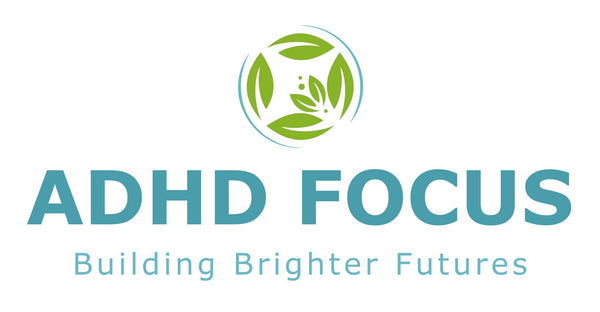
Genetics and ADHD: How Much Is Inherited?
Share
If your child is struggling with focus, restlessness, or impulsivity, you may find yourself wondering: “Did they get this from me?”
It’s a question many parents ask, and scientists have been searching for the answer for decades. By 2025, the evidence is clear - ADHD often runs in families and genetics carry a heavy influence. But inherited does not mean inevitable, and the environment you create for your child still matters more than you may realise.
To understand how much of ADHD is passed down through genes and how much is shaped by a child’s surroundings, let’s look at what the latest research reveals.

What the Science Says About ADHD Heredity
ADHD is among the most heritable neurodevelopmental conditions studied. Research shows heritability estimates between 70 and 90 percent, which means the majority of risk comes from genetic factors. In 2025 a large genetic study in Life Science Alliance reported ADHD heritability of about 74 percent, confirming years of family and twin research.
If a parent or a sibling has ADHD, a child’s chances of being diagnosed are five to ten times higher than for children with no family history. Still even with strong genetic influence, many children with a family history do not develop ADHD.
Why Genes Are Only Part of the Story
Genes provide the blueprint, but environment decides how the building takes shape. A child may inherit a higher risk, but factors such as pregnancy health, birth complications, ongoing stress, and nutrition all help determine whether the condition develops.
Daily habits are powerful as well. In 2025, researchers showed that children who spent more than four hours a day on screens were significantly more likely to experience ADHD related difficulties. Lack of sleep and low physical activity made the problem worse. On the other hand, consistent routines, physical play, and better sleep often helped reduce symptoms, even in children with strong genetic risk.
Nature Meets Nurture
Genetics set the stage, but the environment helps shape the performance. Factors such as prenatal health, maternal stress, exposure to toxins like lead, premature birth, and even nutrition in early years can all influence how strongly ADHD traits appear.
Scientists are also learning that genes and environment interact. For example, a child might inherit a genetic tendency toward impulsivity, but whether this develops into ADHD symptoms may depend on the experiences and support they receive in early childhood.
What Parents Can Do Right Now
For parents, learning that ADHD is highly genetic can feel heavy. But it can also be empowering. If ADHD runs in your family, you can watch for early signs and step in before struggles at school or home spiral.
Importantly, this knowledge also takes away the guilt. ADHD is not caused by parenting style. It is a neurodevelopmental condition influenced by DNA. Your role is not to prevent the genes but to create the best possible environment for your child to succeed.

How Treatment and Natural Support Work Together
Prescription medication has been the common treatment in ADHD children for decades. But new research highlights that behavioral therapy and parent coaching can often work just as well, especially in younger children. Early support improves focus, reduces hyperactivity, and helps families find calmer rhythms.
Natural remedies are also part of many families’ approaches. At Feelgood Health ADHD Focus, you can find effective, natural remedies that support brain health, encourage calmness, and help with concentration. Parents often use these remedies alongside professional care, finding that they smooth out daily challenges and bring more balance into home life.
Frequently Asked Questions
Q: If ADHD is genetic, does that mean my child is destined to have it?
No. Genetics raise the risk but do not guarantee a diagnosis. Many children with a family history do not develop ADHD.
Q: At what age can ADHD be diagnosed?
Most children are diagnosed from around age six, when school demands make attention and self control more obvious.
Q: Can Feelgood Health ADHD Focus remedies be used with prescription medication?
Yes, these natural remedies can safely be used alongside prescription medications like Ritalin. Some parents, under guidance of their prescribing doctor, reduce or even stop the prescription medication totally, once they see that these natural remedies are working well for the child.
Should I blame myself if ADHD runs in my family?
Absolutely not. ADHD is not caused by parenting. Your role is to recognise the signs, seek support, and create a healthy, structured environment for your child.
The Takeaway for Parents
Genetics explain much of ADHD, with research showing a heritability of up to 90 percent. But genes are not destiny. The environment you provide, the routines you build, and the supports you choose make an enormous difference in how your child experiences focus, learning, and behaviour.
The good news is that ADHD is manageable. With professional guidance, natural support, and informed parenting, children with ADHD can thrive. The latest science gives families not just knowledge but a chance to act early, reduce stress, and build confidence in the journey ahead.
Related Products
- BrightSpark: Homeopathic remedy to help manage restlessness, impulsivity and attention challenges naturally.
- Focus & Calm: Herbal brain tonic for better focus, memory and concentration.
-
MindSoothe Jr.: Gentle herbal support for emotional balance in children.
Related Articles
-
Are Children with ADHD at Greater Risk of Depression?
-
Why So Many Girls with ADHD Go Undiagnosed
-
How To Explain ADHD Family Members Who Don’t Believe It
If you have any question, please contact us or leave a comment below for FREE health advice. We always love hearing from you!
